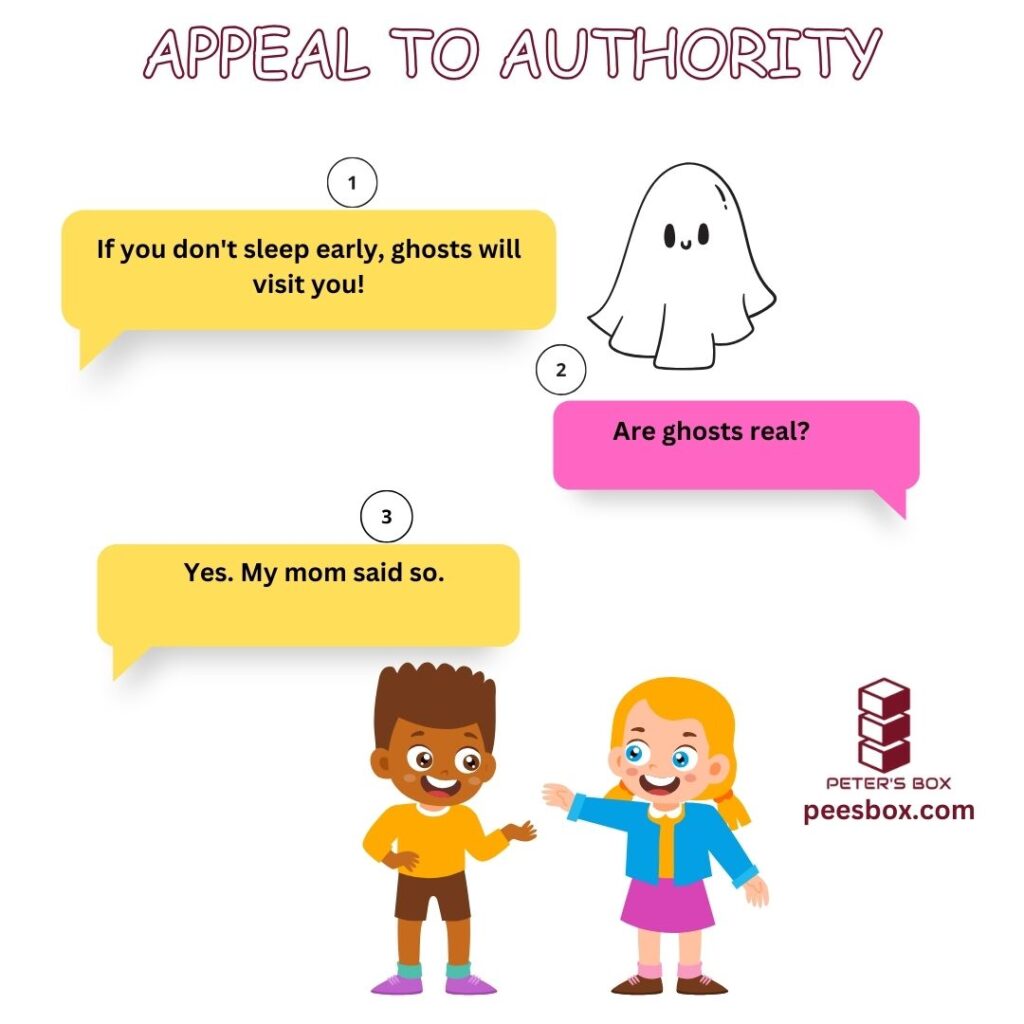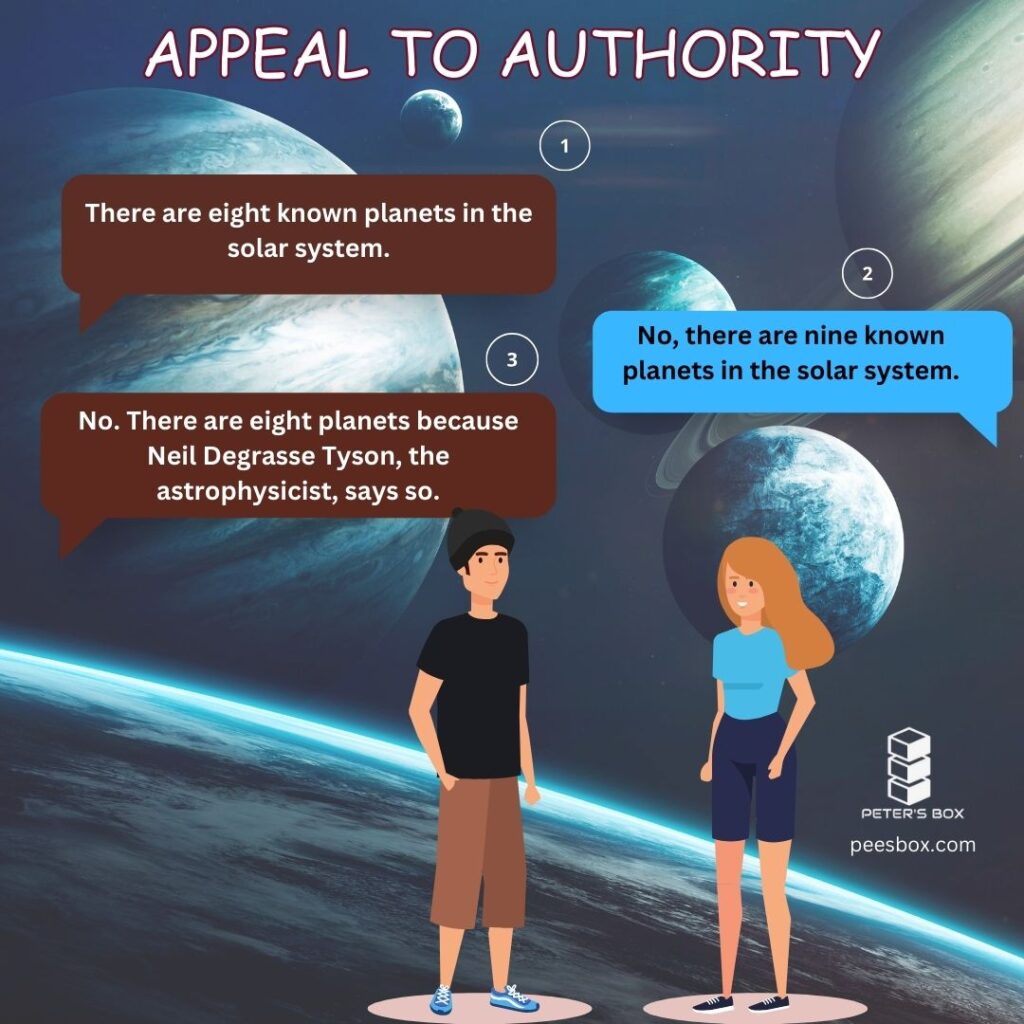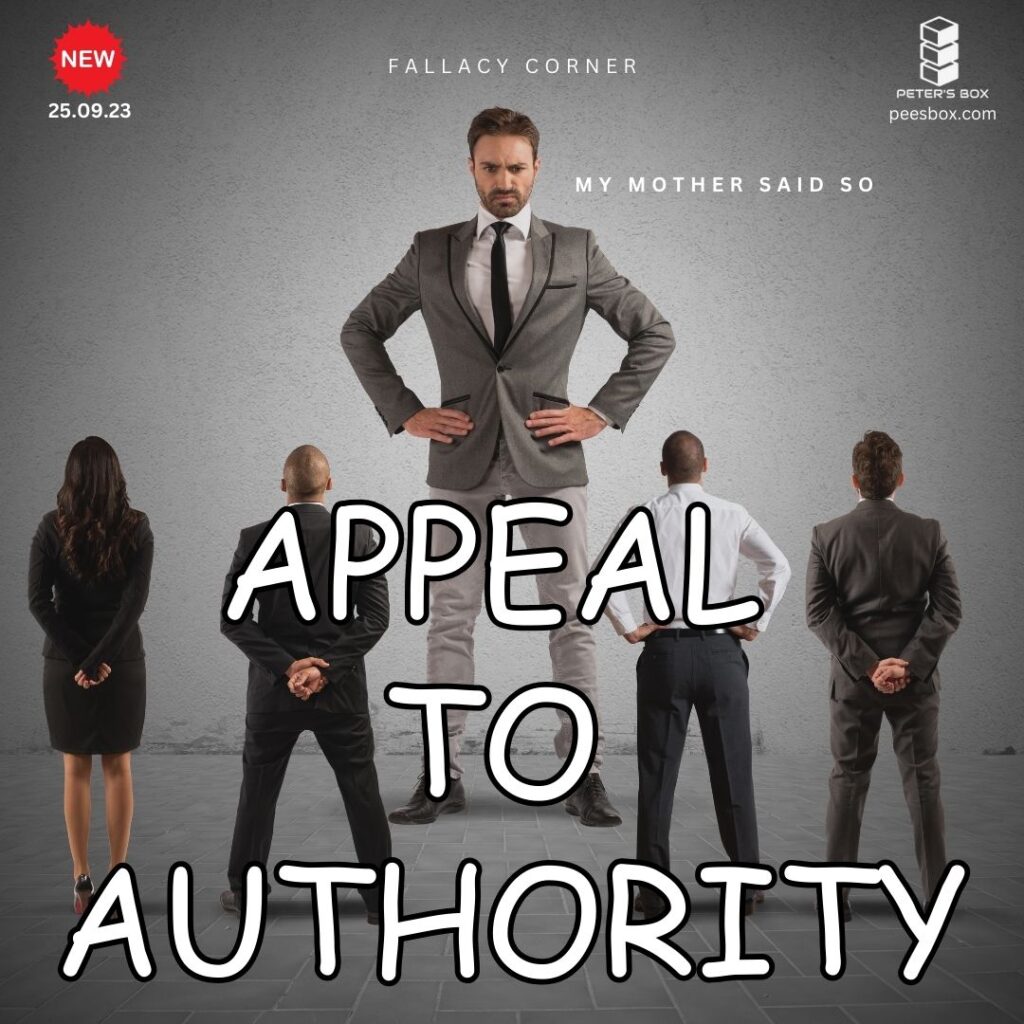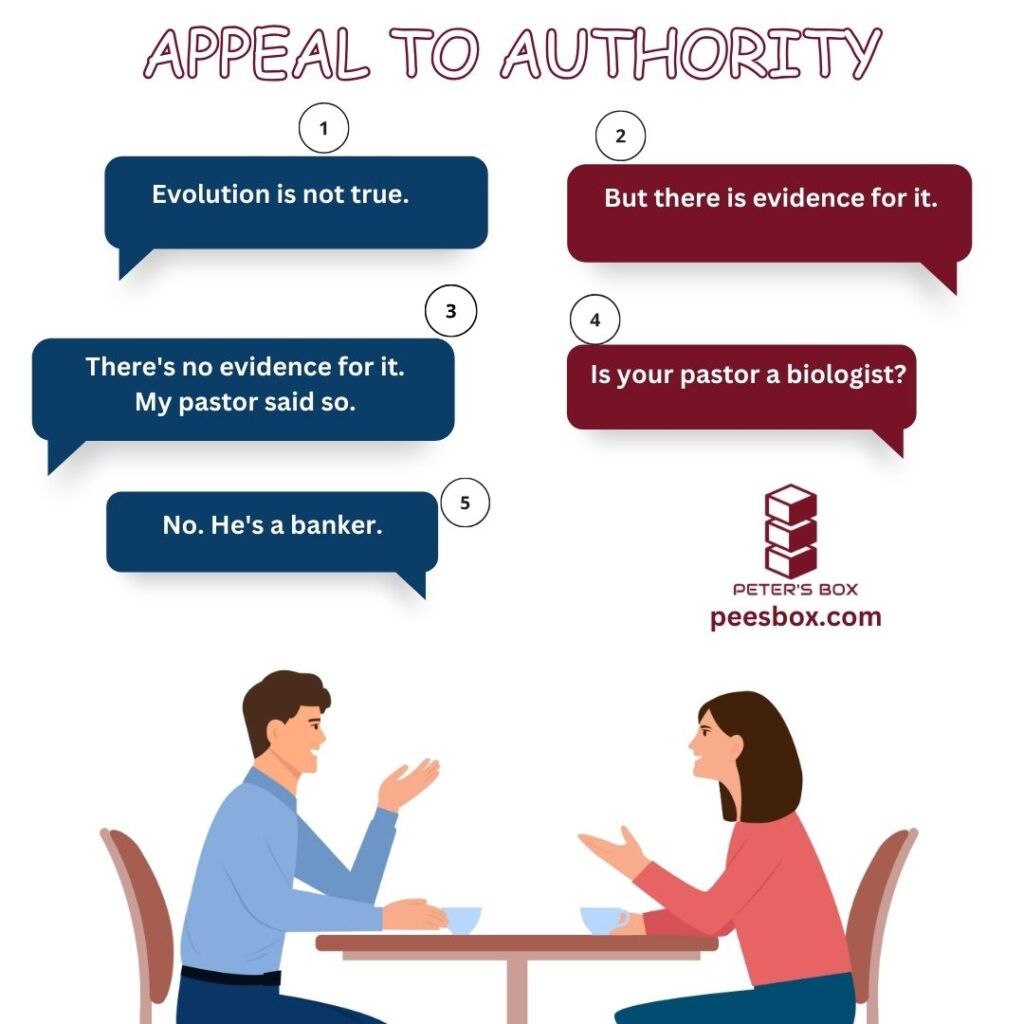The appeal to authority is a logical fallacy I like to call the ‘my mom told me so’ fallacy. You will understand why in a second. If you’re not acquainted with logical fallacies, check out the post ‘Beware of the Beast: An Introduction to Logical Fallacies‘ for a quick primer.
What is a logical fallacy?
A logical fallacy is an error in reasoning. It is a flaw that weakens the strength of an argument. It does not always follow that the conclusion is incorrect. It only indicates that the supporting premises (reasons) that were utilised to support the conclusion are flawed and hence not compelling. Furthermore, if you come across a faulty argument, it is preferable not to accept the conclusion unless you are convinced differently. A logical fallacy is the use of defective or otherwise flawed thinking in the creation of an argument that, if overlooked, appears to be well-reasoned.

Appeal to Authority
The appeal to authority fallacy is a bossy kind of fallacy because it is typical of human nature to defer to authority. Most of the time, when people commit the ‘Appeal to Authority fallacy’, they are probably not aware that they are committing this fallacy.
Have you ever taken an advertisement for a product that included your favourite celebrity on television as proof that it was effective? Have you ever disregarded a claim because it contradicted something your mother said?
If you have, you are already familiar with the workings of the Appeal to Authority. The appeal to authority fallacy is also known as the argument from authority. It is known as argumentum ab auctoritate in Latin. You will also come across the Latin term argumentum ad verecundiam because there are various forms of the appeal to authority fallacy.
Definition of the fallacy
A logical fallacy that leverages the authority status of a personality to reject or accept a claim as true or false is known as an appeal to authority. Three variables must be present in an appeal to authority for the error to be legitimate. They are information, authority, and dismissal or acceptance. The appeal to authority fallacy might be difficult to detect, but identifying these three elements can help you determine whether or not it has occurred. In the fallacy of appeal to authority, a claim is rejected or accepted because of the contrary declaration of an authority, regardless of whether that authority is legitimate. A simpler definition is:
An appeal to authority says that an argument is probably true or false because an authority said so.
Structure of the fallacy
The fundamental structure of an argument from ignorance is as follows:
- A claim is true or false because a person who is an authority or expert on the subject of the claim said so OR
- A claim is true or false because a person who is influential but may not be an authority or expert on the subject of the claim said so.
Example #1
Kofi: If you don’t sleep early, ghosts will visit you!
Ama: Are ghosts real?
Kofi: Yes. My mom said so.
Kofi’s answer is a typical response in everyday conversations where we defer to authority. Deferring to authority is not always a bad thing. In reality, if the authority is an expert on the issue and has been able to substantiate the claim, it is the wisest thing to do. We’ll return to this point later, but first, let’s look at Kofi’s response.

Kofi says that ghosts are real because his mom said so. Does that make ghosts real? If Kofi’s mother had informed him that ghosts aren’t real, we would have expected a similar response: My mother said so. The problem is that Kofi’s response is insufficient. Let us suppose that ghosts exist. Their being real is unaffected by what Kofi’s mother thinks of them. The deficiency in Kofi’s response is evidence. Kofi didn’t actually offer any proof; he just made a remark. Deferring to a source of authority without supporting the claim with evidence is what defines an appeal to authority as a fallacy.
Kofi may have avoided the fallacy by telling Ama about his mother’s explanations or proof for the existence of ghosts.
Example #2
Kofi: There are eight known planets in the solar system.
Ama: No, there are nine known planets in the solar system.
Kofi: No. There are eight planets because Neil Degrasse Tyson, the astrophysicist, says so.
Do you agree with Kofi that there are only eight known planets? Or, like Ama, do you believe there are nine? If you’re a millennial like me, you probably remember learning in science class many years ago that there are nine known planets. They were Mercury, Venus, Earth, Mars, Jupiter, Saturn, Uranus, Neptune, and Pluto. These nine planets will almost certainly be mentioned in any science textbook from the 1990s.

According to the scientific community, there are currently eight confirmed planets, so Kofi appears to be correct. Except that Kofi has committed the error of appealing to authority. He told Ama that there are eight known planets because an astrophysicist said so. This is similar to Kofi’s response to Ama in our first example, in which he stated that ghosts exist because his mother said so.
It would have been better if Kofi explained why there are now eight known planets instead of just saying an astrophysicist said so. The astrophysicist most likely explained why there are now eight known planets at the time Kofi heard this. Here, it is the explanation that matters, not just what an astrophysicist says.
There are eight known planets: Mercury, Venus, Earth, Mars, Jupiter, Saturn, Uranus, and Neptune. Wait! What about Pluto? Isn’t Pluto one of the planets in our solar system? No, Pluto is no longer considered a planet. The International Astronomical Union has downgraded the status of Pluto as a dwarf planet because Pluto meets only two of the three criteria for a full-sized planet:
- It is in orbit around the sun.
- It has sufficient mass to assume hydrostatic equilibrium (a nearly round shape).
- It has “cleared the neighbourhood” around its orbit.

Pluto meets only the first two criteria and is therefore not a full-sized planet. Kofi should have supplied this explanation or pointed Ama to the source of this information.
Common formats
There are certain typical statements used in arguments that will most likely indicate that an appeal to authority fallacy has been or is about to be committed. Here are a few examples:
- Trust me. I know what I am talking about.
- But, Mr. X said so.
- X is an expert on the issue.
- X has no reason to lie about this.
Argument from Inappropriate Authority
Who would you consult for health advice: a doctor or an engineer?
Who would you seek investing advice from: a banker or a plumber?
Who would you consult for repairs on your vehicle: a carpenter or a mechanic?
I’m no mind reader, but I’d guess that the majority of people in these situations would seek the advice of a doctor, banker, or mechanic. This is because every field comes with its own expertise and needs a dedicated understanding of the subject matter. There are even specialisations in the medical world. An optometrist is a doctor who specialises in eye care. A cardiologist is a doctor who specialises in heart diseases.

An optometrist will likely be more knowledgeable about eye-related problems than a cardiologist. A cardiologist is likely to be more accurate than an optometrist when it comes to diagnosing heart problems. On the issue, this authority is considered appropriate or sufficient. An inappropriate or insufficient authority is one with little or no expertise on the subject matter.
An appeal to authority might be an appeal to inappropriate authority. It is so in most cases of appeal to authority. Someone who has celebrity status is treated as an authority on any subject merely because of this status. Status is usually highly valued in most societies. As a result, celebrities are often referred to as influencers. Let’s look at an example.
Example #3
Kofi: Soda drinks are very healthy. I take one every morning.
Ama: Soda drinks are not healthy. Why are soda drinks healthy?
Kofi: Because Michael Jackson said so in the advertisement on TV.
Isn’t Michael Jackson the pop singer with the incredible voice and the slick dancing moves? Why is Kofi referring to him when discussing whether drinks are healthy? Kofi’s answer is, first of all, a blatant appeal to authority. Second, this level of authority is wildly inappropriate. Even if Kofi had appealed to an appropriate authority, such as a dietician or a doctor, he would still have committed the error since he did not present any evidence or verification of his assertion. He just made an appeal to an authority without offering proof to support his claim.

Example #4
Kofi: Evolution is not true.
Ama: But there is evidence for it.
Kofi: There’s no evidence for it. My pastor said so.
Ama: Is your pastor a biologist?
Kofi: No. He’s a banker.
This is an example of inappropriate authority being invoked. Kofi believes evolution is not true because his preacher says so. His pastor, it seems, is a banker and not a biologist. To be fair, Kofi undoubtedly regards his pastor as an authority in the religious world. But that doesn’t make his pastor an authority on evolution. The fact that Kofi made a fallacious argument does not render his claim false. The problem here is the justification he gives for his assertion. A claim is not true or false just because someone says so. What Kofi should have done was cite the arguments given by his pastor for the falsity of evolution.
The Vitamin C fallacy
Kofi: Take some Vitamin C to cure your cold.
Ama: Really?
Kofi: That’s what doctors recommend.
Has Kofi committed the appeal to authority fallacy? You might argue that he’s making an appeal to the appropriate authorities. However, the fact that you are appealing to the appropriate authorities without presenting evidence or proof renders this a fallacy. This is becoming insane, Peter! Can we no longer put our faith in appropriate authorities? That is not what I am saying. We have faith in the proper authorities since they are better positioned to deliver reliable information on their subject. It is the provision of correct information that is important. Instead of just mentioning their authority, refer to the explanation they offered.

Vitamin C does not cure cold
If Kofi had tried to explain why doctors recommend vitamin C, he would have discovered that there is no scientific evidence to support the notion that vitamin C cures colds. In reality, studies indicate that vitamin C will not treat a cold. So where does the idea that doctors advise vitamin C for colds originate from?
The obsession with vitamin C and the common cold can be attributed to Linus Carl Pauling. Linus was a chemist, biochemist, chemical engineer, and educator. Of the more than 1,200 books and articles he authored, roughly 850 were on scientific topics. This American chemist became the first individual to receive two distinct Nobel Prizes. His first prize (1954) was granted for research into the nature of the chemical bond and its use in revealing molecular structure. His second prize (1962) was awarded for his efforts to prohibit nuclear weapon testing.
In 1960, an audience member Irwin Stone present at a talk Pauling delivered wrote a letter to Pauling suggesting that if he wanted to live longer, he should take 3,000 mg of vitamin C daily. Pauling said he felt “livelier and healthier” after following Stone’s advice. “In particular, the severe colds that I had suffered several times a year all my life no longer occurred.”
Pauling increased his vitamin C consumption over the years that followed, finally consuming 18,000 mg daily. His scientific passion evolved around vitamin C. In his book Vitamin C and the Common Cold, published in 1970, Linus Pauling urged Americans to take 3,000 mg of vitamin C daily. Click here for the full story.
Why appeal to authority is a fallacy
An appeal to authority or argument from authority is a logical fallacy since citing someone as proof of a claim’s truth provides no relevant evidence concerning the claim’s truth. It just implies that someone said it. To determine the veracity of the claim, an additional layer of proof is required.
One more example
Kofi: Just a drop of this poison in your system can kill you.
Ama: It can’t harm me.
Kofi: Why?
Ama: Because the Bible says so.
Related fallacies
There are other fallacies that are closely related to the argument from ignorance: they are the appeal to tradition and the bandwagon fallacy. An appeal to tradition is a logical fallacy in which a claim is declared to be either true or false, correct or incorrect, because it has always been that way (according to tradition). The bandwagon fallacy arises when a claim is deemed true or untrue because everyone else believes it or is acting in that way. These fallacies will be covered in greater detail in future posts.
How to avoid
Don’t merely cite someone when you need to provide evidence for a claim you’ve made. You can quote or defer to the person’s authority, but always provide the explanation the authority supplied concerning the claim. Your argument will be stronger and clearer if you do this.
What’s next in Peter’s Box? ¡Hasta luego amigos!






